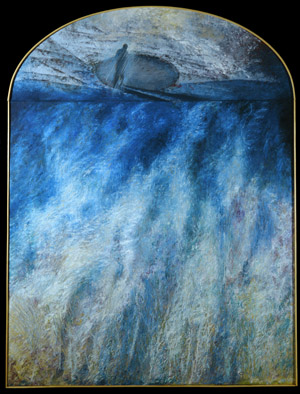

Honi Ha-me'aggel (the Circle-Maker) was a renowned pietist in the period of the Second Temple (first century BCE) who was said to have performed good deeds by using extraordinary powers of prayer or by performing miracles. According to popular legend, Honi slept for seventy years and on awakening prayed for death rather than living in a strange world.
The following story, which tells of his power to bring rain in times of drought, is recorded in many sources. His name, ha-Me'aggel ("one who draws circles") is usually taken to be connected with this incident[1]. Some scholars claim he was named Honi Ha-me'aggel after the place from which he came, [2] while others suggest he was so called as he was often called to repair roofs or ovens, with a ma'gillah ("roller").[3]
Our Rabbis teach: Once in late Adar (actually 8 and 9 of Adar, then rains on the 20th), no rain had fallen. They sent for Choni Hame'agel and asked him to pray for rain. He prayed, but no rain fell. He then drew a circle and stood in the center, as the navi Chavakuk did. As it says, "by my guardings I'll stand, and I will stand by my siege." Choni said "Master of the world,I am like a son to You. I swear that I won't move from this place until You have mercy on Your sons." A light rain began to fall. His students then said to him, "It seems like rain is only falling so you can be freed from your oath."
Choni answered them, "I asked for rain to fall and fill the wells and springs, not drops like this." Then the rain began to fall very heavily, each drop the size of a "lug" (about half a liter). His students then said to Choni, "This rain looks like it is falling to destroy the world." Choni replied "I never asked for such rain; I asked for rain of blessing." The rain continued to fall heavily until the people had to go up Har Habayis to escape the flooding. Choni's students then said to him, "Pray that the rain should stop." Choni said, "I was taught never to ask for too much good, nevertheless bring me a cow to sacrifice." They brought him a cow, he placed his hands on it, and said "Master of the World, Your people who You brought out of Egypt can't take too much good or too much bad. May it be Your Will that the rain should stop, and there should be a wind in the world." Immediately the wind began to blow, the clouds dispersed, and the sun shone. The people went out into the fields and brought mushrooms for themselves (Bavli, Taanis 23:1).
Then Shimon ben Shetakh, head of the Sanhedrin in Jerusalem, said to Honi, "I should excommunicate you for your audacity,[4] but how can I, since you're Honi! God coddles you as a father does his young child. The child says: 'Hold me, Daddy, and bathe me, and give me poppyseeds and peaches and pomegranates,' and his father gives him whatever he wants."
The extraordinary rain in the story of Honi has a deeper meaning; it has been connected to the waters of the mist which we read about in the sixth day of Creation. Rashi explains that the water that God used to mold the dirt for man's creation came from no ordinary rain, but from a unique mist which ascended from the waters of the impenetrable deep.
In the larger panel of this painting, torrents of rain water are suggested - rising upward from the earth. The two humble elements of water and dirt which God used to create man are also the framing elements of this narrative. Although Man is ultimately earth and water, he can reach up to heaven to beseech God and to demand of him compassion and mercy.
[1] Rashi on Berakhot 19a
[2] Zemah Ga'on in Sefer ha-Yuhasin ha-Shalem
[3] S. Klein & S.H. Kook in Zion 1 (1929/30)
[4] for troubling the All-Mighty so many times about the rain